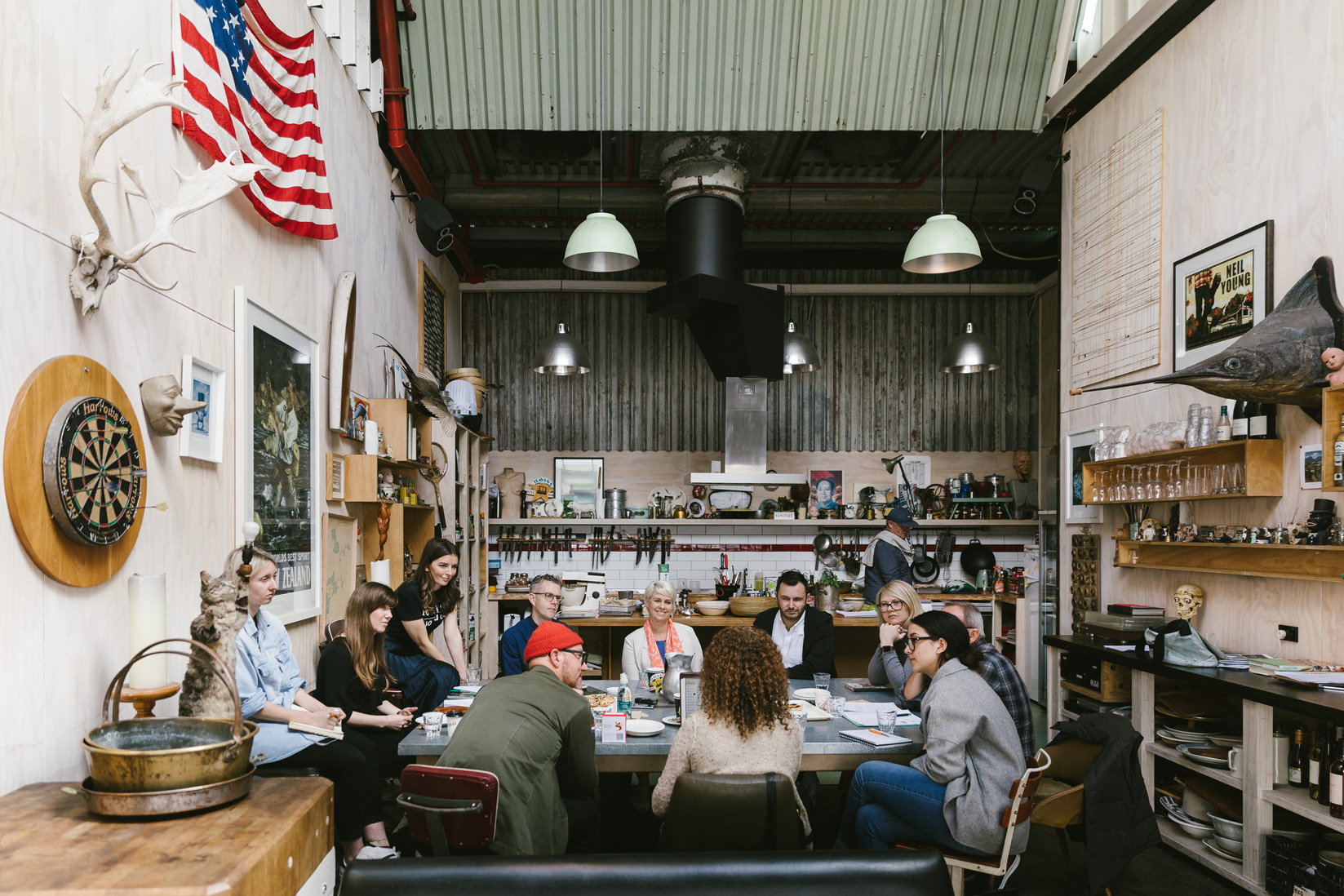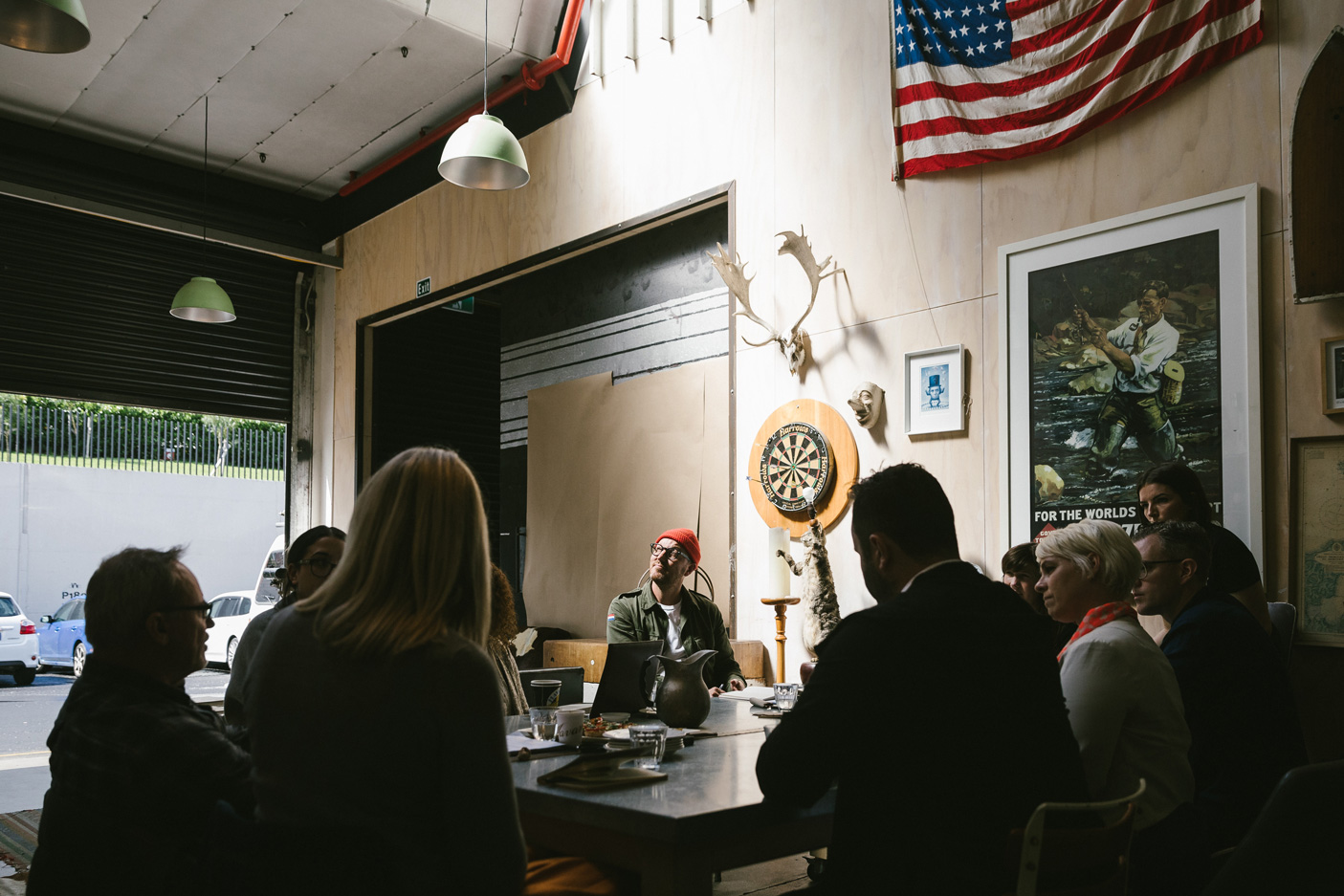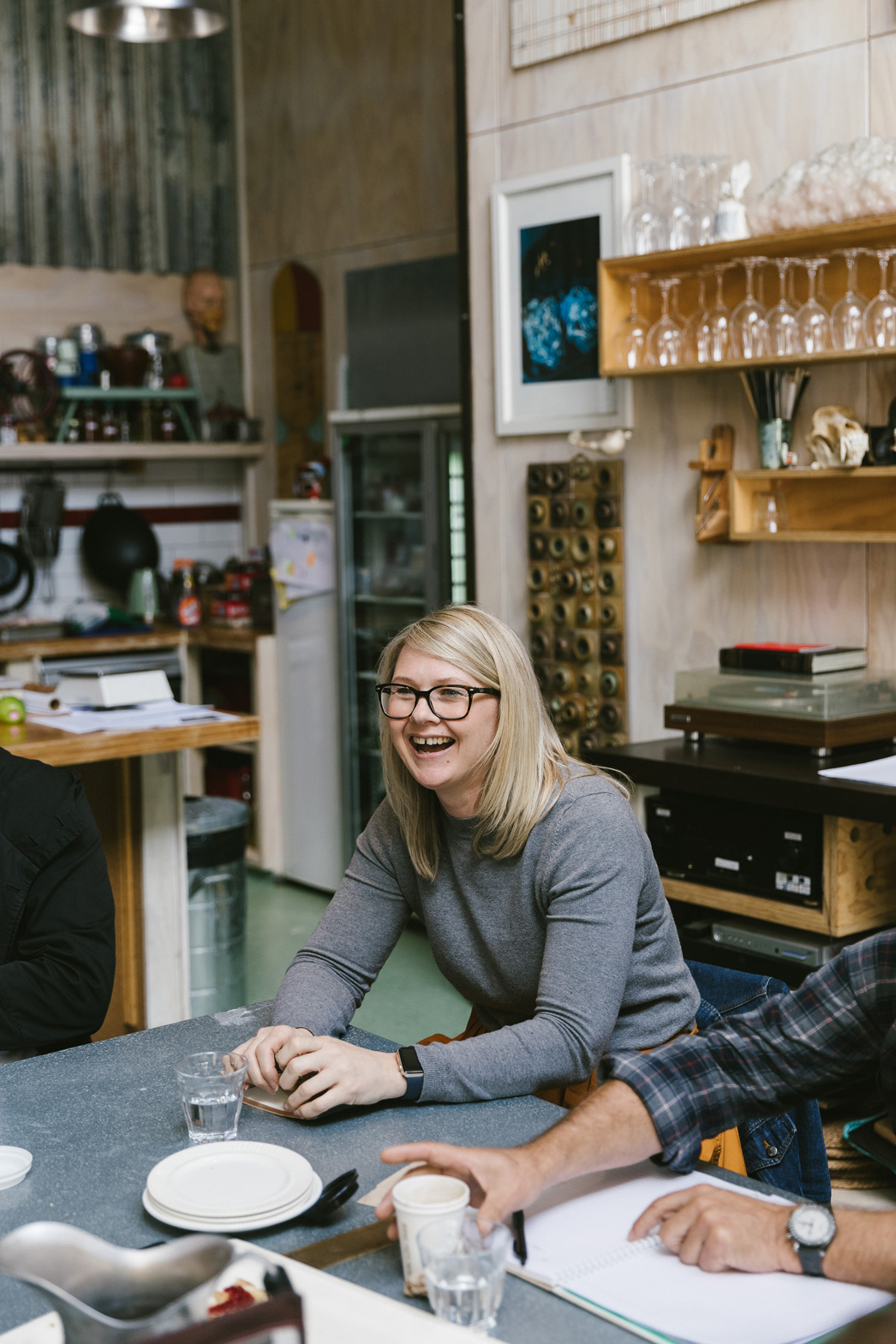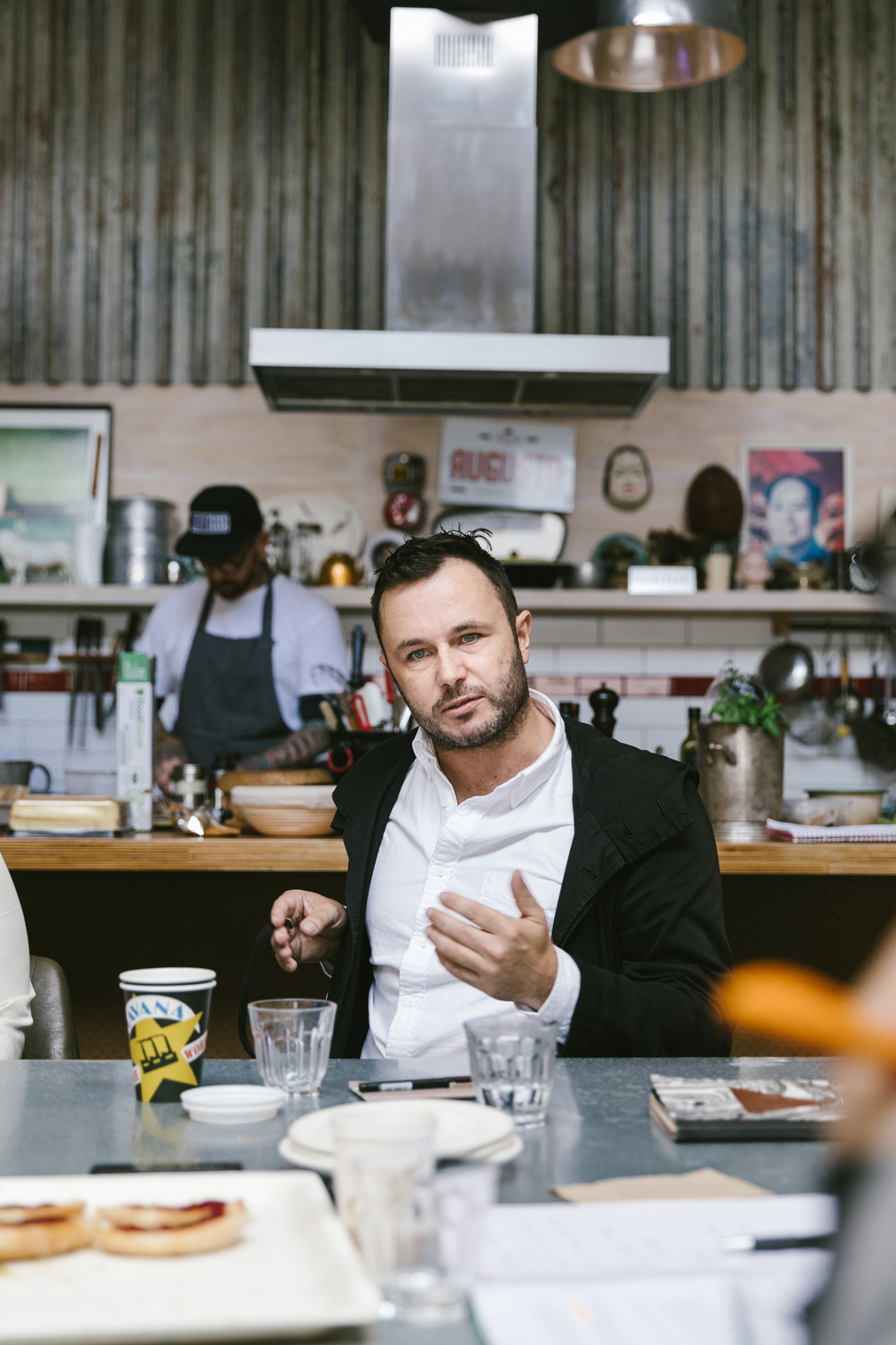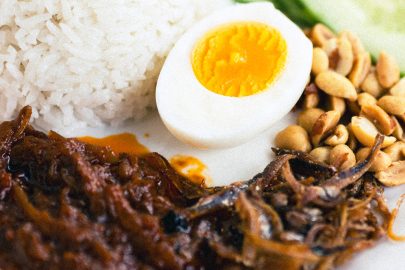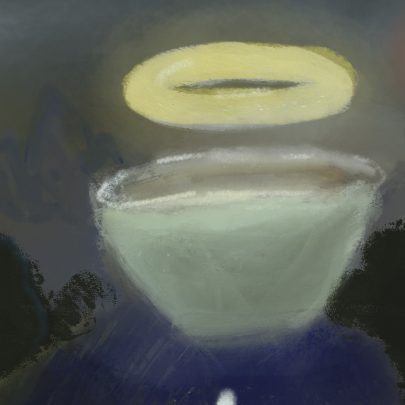Oct 27, 2016 Cafes
As part of Metro’s annual cafes issue, we invited a cross section of Auckland’s coffee scene to a round table discussion about the state of the industry in 2016.
Photos by Rachel Soh.
Metro food writer Courteney Peters led the discussion, which was structured so that each attendee spoke for four minutes each on a given topic before opening that topic to the group. We were ambitious in the breadth of the topics, probing everything to do with coffee in 2016; from the ethics of the supply chain to the role of the barista. In order to get a variety of perspectives, we invited:
- Michael Allpress, founder Allpress Coffee
- Glenn Bell, owner of eighthirty
- Rachel Berry, business development and partnerships manager, The Barista Academy
- Al Keating, CEO Coffee Supreme
- Saskia Kirkbeck, customer care, Red Rabbit Coffee Co.
- Anna McGregor, co-founder of Coffee Lab
- Mike Murphy, managing director of Kokako
Al Brown & Co kindly hosted the two-hour event, an edited transcription of which can be found here. Find a summary of the discussion, and our annual list of the top 50 cafes in Auckland in our November 2016 issue, on sale now.
1. Auckland’s coffee roasting history
(Led by Michael Allpress)
Michael Allpress: I was catching the ferry in today from Waiheke and thinking about the last 20 years. To think about coffee in this country, you have to go back to the idea we’re a British colony, it was very much a part of our make up as a nation.
When I founded Allpress (1986), the morning tradition was toast and marmalade before running out the door. But the landscape’s changed. It’s quite interesting to look at our heritage from tea, to instant coffee to espresso and alternative brewing methods. There was a big gap where we missed out roasting ground and non-pressurised brewing methods, which is interesting when you think about where the global industry is heading. Allpress has played a part in the development of espresso culture in New Zealand. My background was roasting ground at home, I had quite adventurous parents in terms of food and beverage, but returning from travelling, and being in America seeing old style car manufacturing and merchandising, the initial concept for Allpress was a specialist cart business, which quickly moved into roasting and wholesale supplying.
I guess the focus for Allpress at that time was building the business around customer service and flavour. The flavour aspect runs through our DNA as an organisation, everything we do is about flavour, from bean selection to the way we roast.
Our focus around flavour was on bean selection, back in the day there weren’t a lot of good quality beans being brought into the country. We had two options, in terms of beans selection. Supreme and Allpress quite quickly realised this and I remember having a meeting with John Burton and Chris Hilling and saying come on John, present some better coffees, we know they’re out there. It was a charade, we were cupping coffees and realised we needed to go out there and do it ourselves.
Training and preparation was also important. Customer service and support, a lot of customers back then weren’t getting technical support, equipment or training for that matter and that shaped us as a business.
Al Keating: About 10 years ago, before Supreme I was at Atomic, and I remember rushing out and looking at the annual Metro cafe issue and it was always really dominated by Allpress. How have you seen the past ten or twelve whatever years where lots of smaller companies have rushed in?
“We had the market to ourselves until a while ago.”
Michael: Well we had the market to ourselves until a while ago.Today it’s far more competitive and the margins are tighter. Supreme was the first viable alternative to Allpress is terms of quality, service, support – and full credit to you guys. After Wellington, Auckland’s the natural place to go, it’s the next biggest market. I think you guys did a great job and continue to do a great job, collectively, along with Craig Miller, we’ve grown the expectation of the consumer. New Zealanders have a very high expectation of what they’re going to get in the cup.
Courteney Peters: How do you think the role of the roaster has changed over that period of time? What do you do as a company now that you didn’t then?
Michael: Nothing really – it’s still our core focus to supply a really high quality product. We’re espresso specialists, we’ve dabbled in non-pressurised brewing methods and I really enjoy filter coffee, I don’t always go espresso, and it’s shifting in that respect. I’ve just recently returned from time in Berlin at a coffee festival and in New York. There are some leading edge guys in Berlin that are just roasting so light – there’s a process that’s sort of been born that’s quite a naïve and ignorant approach to coffee. And it’s great they’re exploring light roasted, single origin coffee, but there should be a wall between that approach and the espresso machine, they shouldn’t go near it. I was drinking some espresso in Berlin and my mouth puckered up because it was so sour. It’s like the Emperor’s New Clothes, it’s seen as a point of difference and in London this is the way to go. But for consumers, they’ll try and like it, but espresso is always about a balance, getting that balance right through a blend and an appropriate roasting technique.
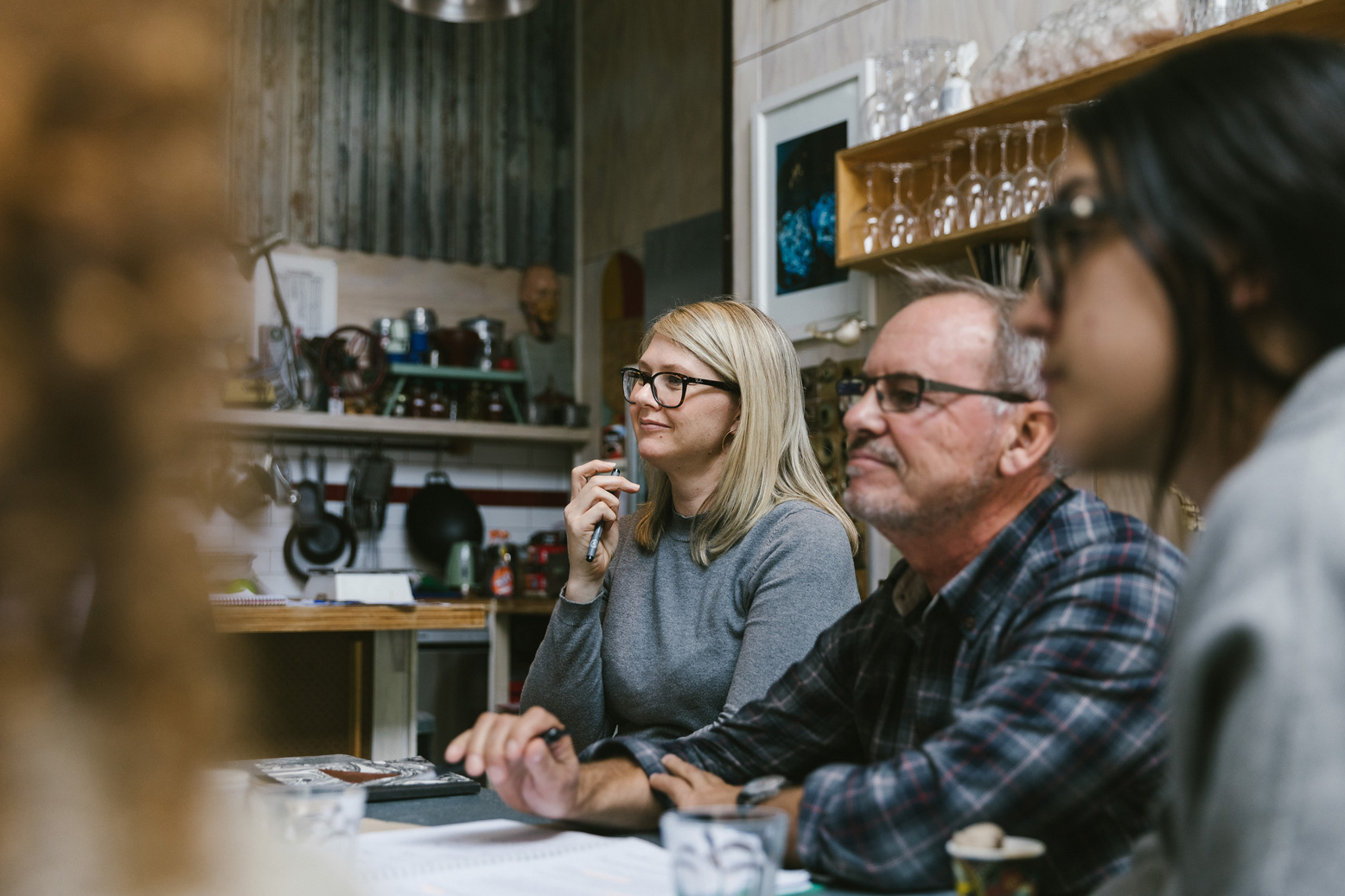 Saskia Kirbeck and Michael Allpress.
Saskia Kirbeck and Michael Allpress.
Courteney: Do you think it’s less about a quality cup of coffee but service to your cafes and your role as a roaster speaking to new cafes as a consultant?
Rachel Berry: I think it’s symbiotic, a roaster’s role has changed and their success depends on the success of their accounts. And back in the day they didn’t really want to know? But now there are so many you kind of have to do that extra bit. It’s not about umbrellas or signs anymore, it’s about how can you help their business succeed.
Michael: It was never about umbrellas, really.
Anna McGregor: I would say, along with yourself (Allpress) that Jeff Kennedy from L’Affare started to import better beans and produce a different type of espresso in Wellington that started to change things. And Geoff Marsland (Havana Coffee).
Michael: Geoff’s an interesting character, I was thinking about him this morning and where the market’s heading and how they’re talking about margins in the business and how they’re being squeezed. Put coffee aside and you’ve got commercial business – Jeff Kennedy did some great things for coffee but he also did some bad things. He bought a company in Wellington and then cut the hell out of the pricing just to get market share, and then slowly put the price back up to market. That sort of behaviour is…we personally don’t like to compete on price and we never have…
Anna: You don’t need to…
“The heritage brands that enjoyed the streets alone back then now share it with so many.”
Al: For the sake of keeping it on heritage, it’s fascinating that back then Allpress, Havana, L’Affare, Supreme, Miller’s – there were a handful of coffee roasters 20, 25 years ago, right? And it was very lucrative. Clearly it was very lucrative – you hear stories about the good old days. But it’s so different now, Auckland belonged to Allpress and Wellington was shared by a few roasters but now it’s so different, it’s so crowded, those heritage brands are still around that pioneered all of this and enjoyed the streets alone back then, but now they share it with so many.
Anna: Wouldn’t you agree that one of the advantages of NZ is that we’re an espresso nation? I’ve travelled overseas and that’s what we’re known for because people like Jeff Kenedy, and Marsden and Supreme. Years ago the coffee exporters would say better coffee is going to NZ, and not-so-good coffee went to Australia.
Courteney: But wasn’t that driven by demand as well though?
Anna: No, it wasn’t driven by demand because people didn’t know. Jeff Kennedy said customers would say it’s not what we’re used to. But he’d say this is what we’re doing and it’s good coffee. It’s about quality. These guys have really molded the journey of NZ into being an espresso nation.
Glenn: It definitely set the bar for all of us to come up to, we’re trying to match a level of service and technical know-how, and it’s been set and if we’re going to be successful we’ve gotta be there as well otherwise we’ll get left behind.
Anna: Yeah I think that in New Zealand because of our geography we’re quite a small nation and that really sharpens relationships, and we actually talk to each other. And that’s been a real strength for the New Zealand coffee industry to grow on.
2. Sustainability: Growing the industry in the face of shrinking margins
(Led by Al Keating)
Al: I thought I’d share a story, maybe an anecdote. In my early days of hospitality and coffee, in the late 90s when I was customer of Allpress, it was not an embarassing thing to ask for a glass of house wine, or even a carafe of house wine, nowadays you’d be laughed out of the room if you asked for that. If you ordered a beer, without question it came in a green bottle and you’d pay seven or eight dollars for it. That wasn’t a shameful thing either, that was pretty normal. Now 15, however many years later, you ask for wine based on what you like to drink, on flavours, on skin on or off, on where it’s grown, on how full bodied or light, that’s wine now and you pay maybe 16, 17, 18 dollars for a glass. Beer, you don’t just point at a bottle on the back bar anymore, you know what flavours you like and where the hops are grown and you pay 12, 13 dollars for that. That beverage is still just having the top popped off it or is poured from a tap.
“10 years ago a flat white was $3.50, right? And now, whey! It’s $4.”
I think those two industries – wine and beer – have done a fantastic job of educating their customers and consumers so that they understand the difference between $7 and $14 in a beer, that’s essentially the same volume, but we, as a coffee industry, have struggled. We’ve improved the quality of our ingredients by getting on planes and going and buying them ourselves, we have spent a lot of money educating staff, teams, growing beautiful brands that represent and speak really clearly to all of those things, but we’ve failed to get consumers to pay more than $4. Because 10 years ago a flat white was $3.50, right? And now, whey! It’s $4.
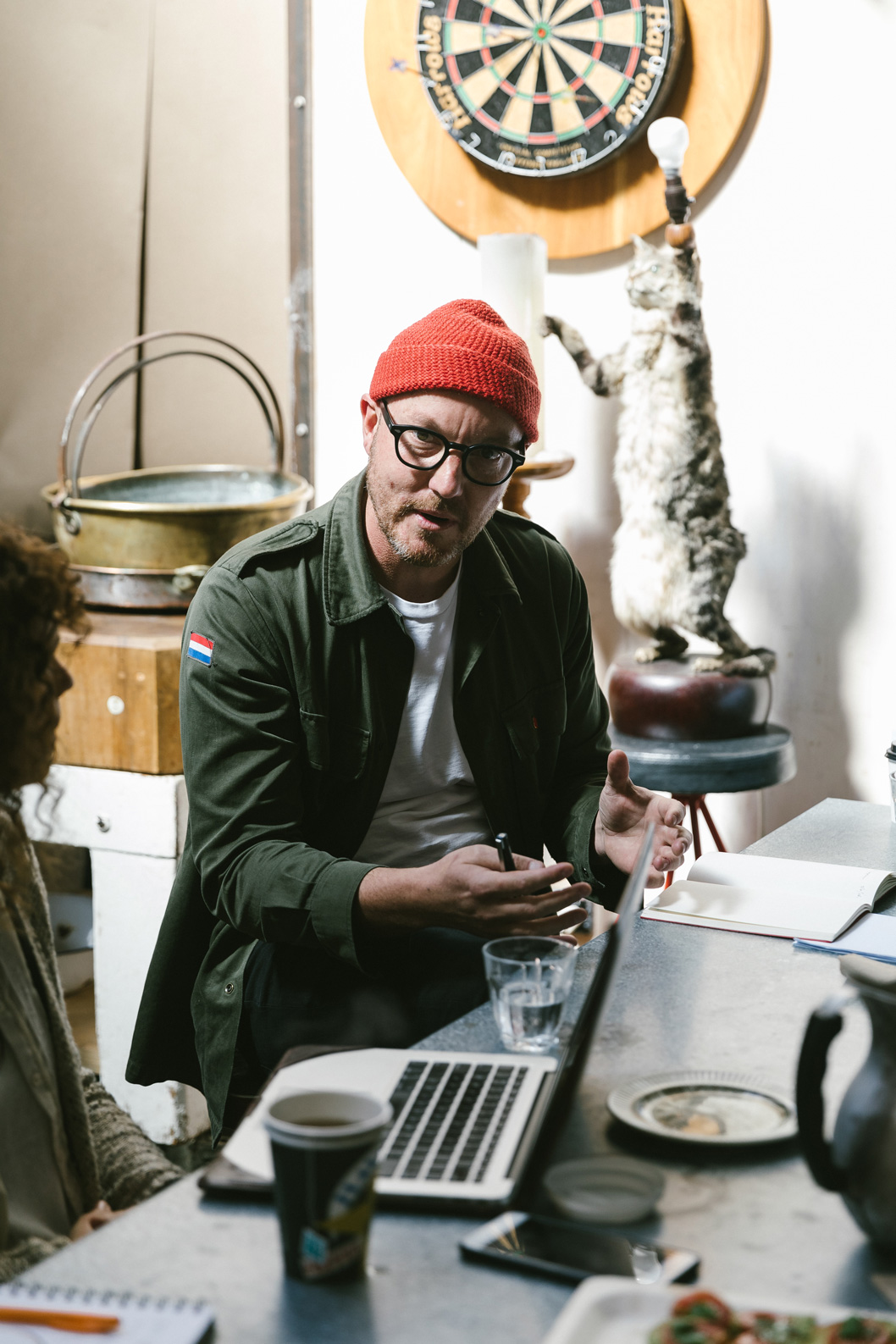 So with this cup of coffee, the price is not reflective of what’s gone into it compared to our brothers and sisters in beer and wine. These two drinks here – a bottle of water and a coffee – both cost $4. The water you can buy under florescent lighting in the forecourt of a petrol station and some kid who may or may not speak to you sells it to you. This one here has been prepared by a snappy looking individual who’s had a lot of training, and in an environment where the furnishings are beautiful and money’s been spent on everything you see, but they cost the same. That’s something we’ve failed at as an industry, we need to pay more for the coffee for the ingredients and time it’s taken to prepare.
So with this cup of coffee, the price is not reflective of what’s gone into it compared to our brothers and sisters in beer and wine. These two drinks here – a bottle of water and a coffee – both cost $4. The water you can buy under florescent lighting in the forecourt of a petrol station and some kid who may or may not speak to you sells it to you. This one here has been prepared by a snappy looking individual who’s had a lot of training, and in an environment where the furnishings are beautiful and money’s been spent on everything you see, but they cost the same. That’s something we’ve failed at as an industry, we need to pay more for the coffee for the ingredients and time it’s taken to prepare.
Courteney: What’s the solution then?
Al: Well, here we are, industry leaders and it’s our responsibility to find solutions. I think education is part of it, I think we need to get Kiwis across the line in regards to mediocrity. I think Kiwis tolerate too much shit, they tolerate too much mediocrity. It’s so easy – how often do you hear someone say I’ve got a café on the ground floor of my building, they make pretty shit coffee but I just go there. Going there keeps that place afloat at the expense of places that are really, really good. And the places that are really good are surrounded by shit cafes but they all charge the same price, because Kiwis don’t want to pay more than whatever they’re happy to pay for a cup of coffee. Kiwis prop mediocrity up, and I’m surprised that more cafes and groceries don’t go under.
“I think Kiwis tolerate too much shit, they tolerate too much mediocrity.”
Anna: We’ve just put some prices up, our flat white prices at Coffee Lab are $5 because it’s a premium drink, 21g, and because they’re single origin, quality coffees, hardly anyone’s said anything. But at our city store, I’ve put the large coffees up just 50c and everyone’s got so emotional about it.
Courteney: I was in Melbourne a week ago and one of my friends chose to buy an $8 filter coffee because it was special, and she’s educated about coffee and said it was fine to do that.
Glenn: Certainly with filter it’s easier, but with espresso – I think the media’s got a part to play in it – like every other week there’s a story about how coffee is too expensive, and Coffix is selling at $2.50, and we’re making too much money and ripping everyone off. Either that or you shouldn’t be spending money on coffee, you should be saving it. Westpac has an ad at the moment about the money you spend on coffee should be going on your holiday to Fiji…
Al: If you drank one less coffee a week or a day…coffee has become a currency for saving at the expense of coffee.
Rachel: The unfortunate thing about our industry is that these guys can produce an amazing bean, but often it’s about what happens after that. I think that often a barista is letting down an amazingly roasted bean because they’re not trained properly. And I’ve seen it, I’ve seen every roaster’s coffee in this room butchered by inexperienced baristas. And it breaks my heart…this customer is going “With a bottle of wine I know what I’m getting”, there’s less differentiation, with coffee that variation is crazy.
Mike: Well to Al’s point, we’re providing an unfinished product to the market, and there’s a real risk with providing an unfinished product, unlike a bottle of water, or Karma Cola or whatever it might be. Even though all of us collectively put a lot of effort into training, we can be let down by a rogue barista very easily.
Courteney: Let’s talk about the trend of flipping cafes, of buying with the intention of selling quickly for profit. How, as roasters, do you deal with that? With investing in training and time with a café that quickly sells?
Michael: If you’re on a crusade to make sure every barista makes a perfect cup everyday, you can do your best, you can put great training programmes in place and spend time with them, have trainers in the field, but yeah it’s interesting that flipping cafes.
Glenn: It definitely, from my perspective, seems to be something we’re seeing more and more. There are definitely people who are known to us in the industry that are renowned for it. Quite often we have been left when it’s been sold and it’s a pretty rapid downhill spiral a lot of times. We can’t mitigate that, we just hope it gets passed onto a great owner.
Rachel: That’s how we’ve deliberately positioned ourselves, we give the basic grunt of the training of baristas so that these guys can just do the high-level, polishing on top. Because no one else is doing it, the technical colleges aren’t doing it – they’re producing people with less knowledge and wrong knowledge and that’s damaging to all of us.
Mike: I think for us, it comes down to pre-qualifying who we want to work with. It’s not a right to work with all of the companies in this room. So we do a weird dance where we suss each other out, are they passionate? Do they really care about the craft of coffee? Are they willing to spend money on a good machine? Do they tick our boxes? Do they want a collaborative relationship, or do they just want a supplier relationship? And if it’s the latter, it’s generally not really of interest – for our company at least.
“If someone rings up and asks ‘how much is your coffee and can I get a free machine?’ Then it’s generally a no.”
Anna: These are the numbers for you to ring! The amount of times I’ve been asked “Are you going to franchise soon?” and my answer is always, if you can tell me a formula to sell passion, I’ll talk to you. Because you can’t sell passion, passion’s caught, not taught. People either have that or they don’t.
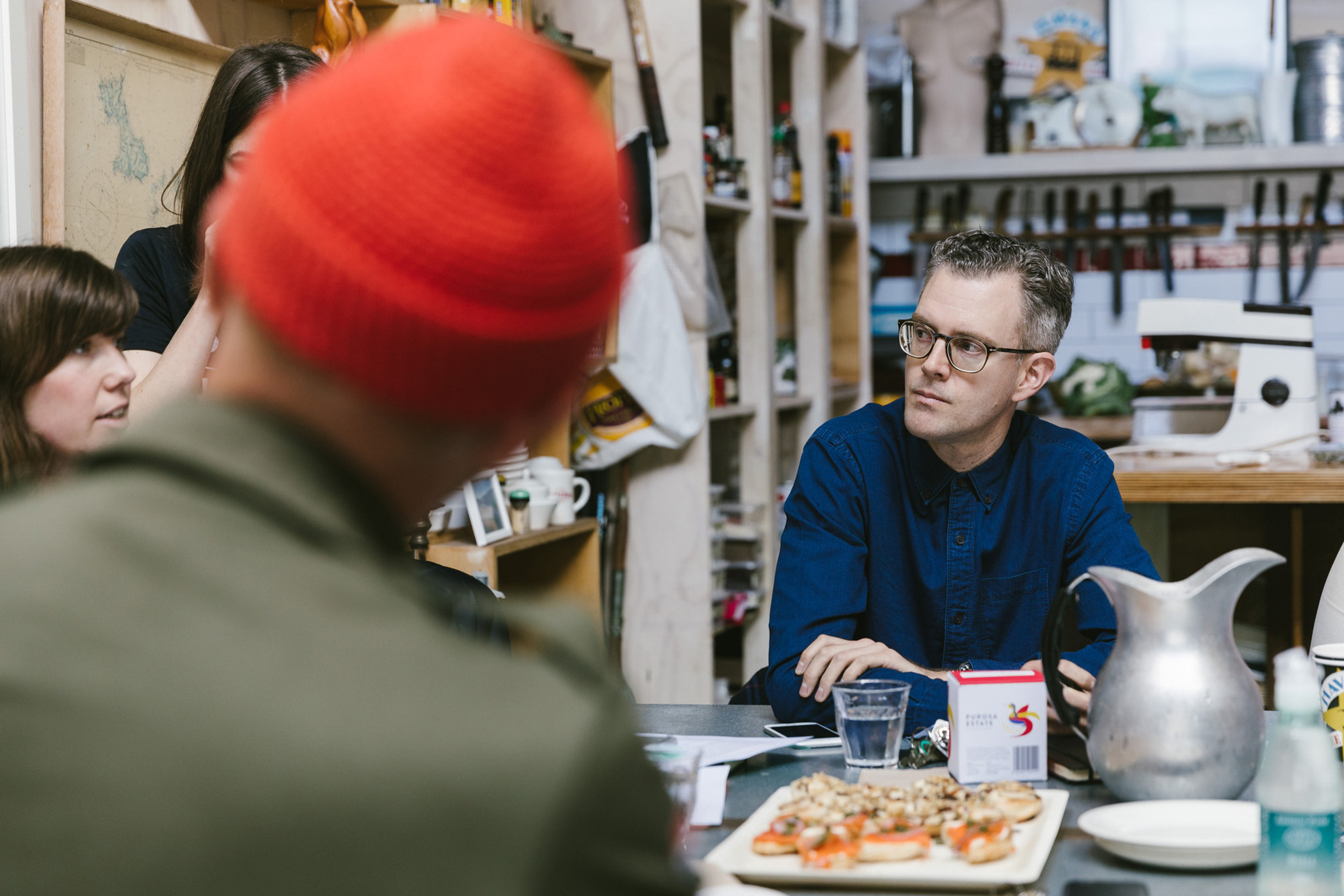 Courteney Peters and Mike Murphy.
Courteney Peters and Mike Murphy.
Mike: I don’t know what we can do about cafes that change hands all the time though, market forces will dictate that and the reality is that it’s their prerogative whether they sell that café or not. Often some operators will sell because that’s the only way they’ll make money, they’re not making it the way through, they’ll just make it on exit. And not everyone is in it for a career.
Glenn: And if our margins are getting squeezed, then it’s even worse for cafes.
Al: I had a conversation with a customer in Wellington recently, in a beautiful café that’s very well known, and they talked about their career and café spanning three decades, the 90s, the 00s and now the 10s, And Mike (Allpress), you’d probably agree with some of this. They said in the 90s they made the best money of their lives, they were in a non-crowded market, they were the best in town and they made tons of money and had a good time. In the late 90s they had children and enjoyed a family lifestyle business, they said their kids went to great schools, but they weren’t making as much money but enjoying a cool lifestyle. Now, the most recent decade, it’s survival.
It’s so crowded, and there are so many cafes opening that may well be average, but people are going their at the expense of these guys. So selling is the most tempting option. The downside of selling is that there’s nowhere to go in your career in a café if you’re constantly nervous that your employer is about to sell the business from under you. It’s like every movement that happens because of something – you’ll look back and see that all these kids are opening the coolest joints in town because they decide “fine I’ll go and open my own one because I don’t know who I work for anymore.” People have bought what they think is a very busy cash register, not a hospitality business. So real hospitality stars are bailing out. 24 year olds are making really cool thrifty joints that make it into the top 50. Then they sell.
“In Auckland the landlords are just pure greedy, and they forget a café is a service for the community around them.”
Anna: One thing I’ve observed with the coffee industry globally, right from the farm to the roastery – Illy coffee’s a great example – it’s a generational thing, and it’s a business that’s been there for 20 and 30 years, they’re really good operators and they’re the people who are really doing well. Because we’ve all thought “Oh I’ll go and open a café,” but it’s not as easy as it looks. And one of the other things that’s entering the market is the rental prices, in Auckland the landlords are just pure greedy, and they forget a café is a service for the community around them, and community is what makes towns and cities, it’s the heartbeat. It’s where people go and meet and talk…
Courteney: In the last 20 years the church might have been the meeting base but now it’s the café…
3. Ethical considerations
(Led by Mike Murphy)
Mike: Okay so I suppose the first thing I want to talk about – because I could talk for a long time – is the trade off between ethics and coffee. We’ve worked really hard to make the growers really understand what the expectations of consumers really are. For the last few years we’ve felt like the last company standing in this FTO, fair trade organic space. The reality is Kokako was established 15 years ago as the first organic coffee company dedicated in Auckland. When I bought the business in 2007 I was already into those values and sustainability. So ethics to me is a broader appeal…
But yeah it’s really hard for us, we don’t have the same availability of coffees as a lot of the other people in this room. So we’ve tried to work out what we need to do to get the right coffee, and it’s actually made us more proactive in our approach. And so for the last year we went to Papua New Guinea, took a mini roaster, actually roasted coffee in the highlands, we cupped coffee with the farmers and we taught them what quality was in the cup. And so I see that as a really important function for us.
It’s about commitment, effort, and putting time in to be able to achieve that.
“You don’t have to travel to origin to be ethical. You just need to ask deep questions.”
You don’t have to travel to origin to be ethical. You just need to ask deep questions. You need to be able to understand your supply chain. I think that’s the most important thing. We talk often about being more than just fair trade, we talk about it as being a conduit to us understanding more about coffee, and understanding more about consumer expectations. We’re about to send two of our staff on a trip to origin to teach coffee farmers in India and Indonesia how to cup coffee. Because many coffee farmers have never tried your coffee, or cupped coffee. Our job as an industry is to give back and teach them what quality in the cup actually means.
The other thing about being ethical, it doesn’t just mean being ethical at origin. You can do other things in the community that are ethical, you can do staff working bees, we did one in Rotorua a couple of weeks ago for the kokako, you don’t have to jump on a plane to be ethical.
Your last question – how can you create an industry where nice guys finish first? I’m not sure, but I’ve definitely sacrificed profit for long term sustainable business, financial and environmental sustainability. It’s a long game, it’s a different mindset to flipping cafes.
“We can’t put the cost of our business onto society anymore, those costs have to be factored into our business.”
Glenn: Ethics and economics – coming from when brands started coming about, the Mad Men era, brands were narcissistic and full of shit and there was nothing really behind them. But now with the internet, and in a free market, you can know everything about the brand. We’re telling our stories and the stuff behind the brand is just as important. We can’t put the cost of our business onto society anymore, those costs have to be factored into our business. Whether that’s using compostible cups or doing composting, we’ve got to be paying a living wage, sourcing good products. We can’t just say our role as a business is to be a profitable as possible. I think the rise of conscious consumers is really making waves, it’s not just about money, it’s about changing the world and that’s about leaving a mark. Not about how big a car or a house you can buy. We want to have meaningful relationships with our staff, the community and the environment.
Courteney: Michael, as Allpress is the oldest roaster in the room, have you noticed a big difference in the past twenty years?
Michael: Oh definitely, and when we were entering the UK market we were really aware of how significant Fair Trade is over there, things like the fact The Body Shop came from there, it’s their ethos as a nation, and we started exploring third party endorsement, third party verification, and we sat round a table and asked which coffees are we going to make fair trade? We can’t just choose one, it has to be all of them. So we started making our own certification system where we went to origin, documented it, made a mark. We wanted people to respect us and our values and how we like to trade. After a while we realised the third party certification wasn’t really necessary, for a number of reasons. Economically, when Fair Trade was valuable to the farm was when trade was really low. But access to the internet, the improvement of production facilities, means that farmers are now delivering us a better product we’re prepared to pay more for. Some of the environmental and landscape thing where people need third party endorsement, they don’t really exist. Some parts of the world like India and Africa there’s still a need, but I’d rather invest in people trusting Allpress in a brand rather than relying on a stamp.
Al: That’s a good point, getting them to trust your brand.
Michael: And it doesn’t stop with coffee, it’s also how your treat your customers and consumers. It should be a values based proposition, you don’t need endorsement.
Glenn: It’s also easy to get a stamp and not actually do anything else.
Courteney: Does that devalue the fair trade stamp for you then Mike?
Mike: Yeah, especially when it’s another SKU (stock counting unit) in a supermarket. We spend a lot of money on certification, and our board has often said “What are we doing commercially? We’re spending an insane amount a year on certifcation”. I want to make sure I can stand behind the mark as well. But what we’ve found though is that through engaging on a deeper level with fair trade certification, we now get much more value from it than we used to. We’ve gone back to them and said hey we need a lot more value than just a minimum price guarantee. We’ve worked on lots of initiatives like carbon footprint calculation. It shouldn’t just be “I’ve got that stamp on there, I’m done”, it needs to be deeper than just the mark.
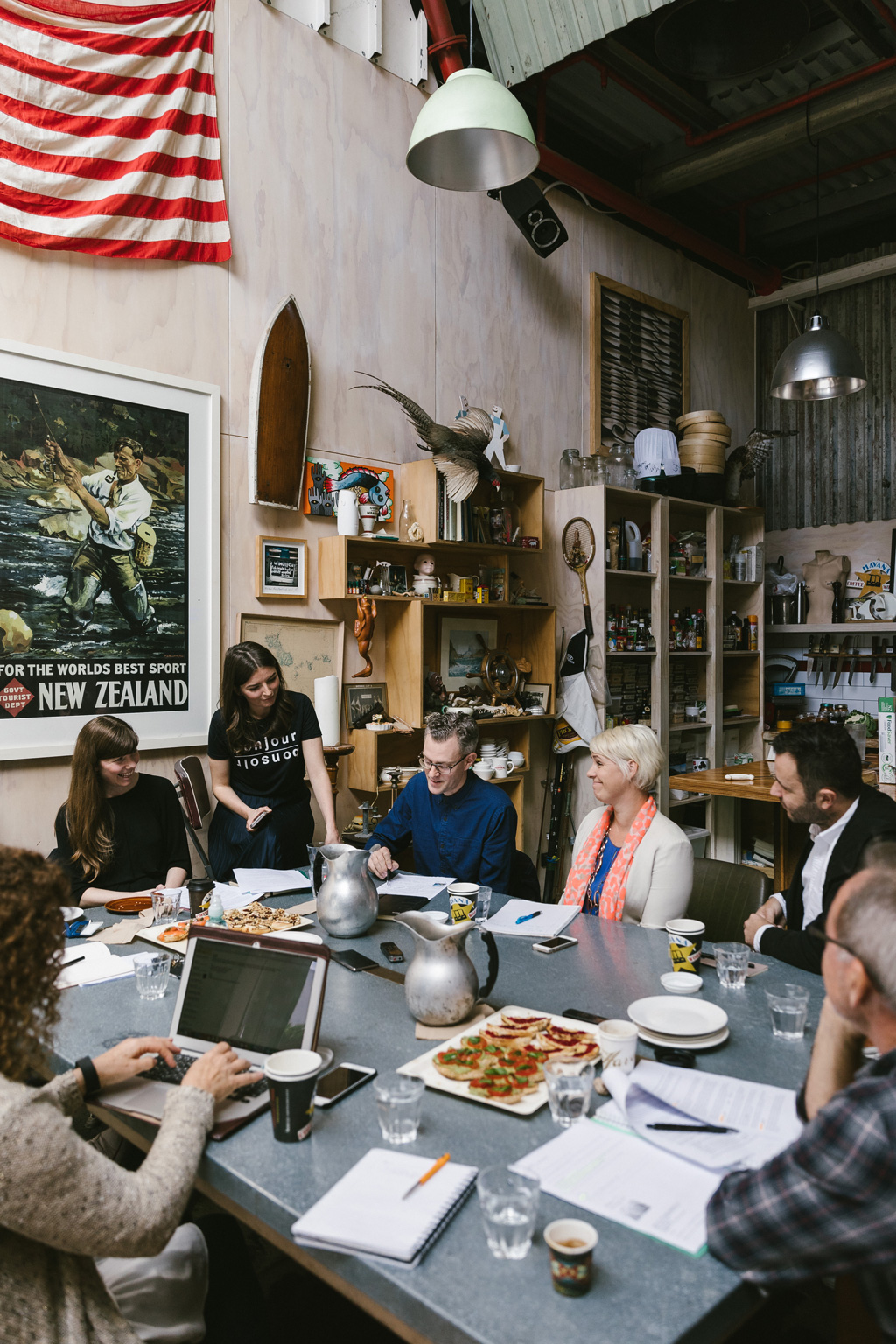 Saskia Kirkbeck: It’s a little bit tricky for me because I’m not involved in the green buying [as head of customer care], but as far as us dealing with a coffee merchant based in the UK we work really closely with them to ensure we get direct or “fair” trade so we know the money’s going back to the farm, the companies we use we trust. It’s an interesting one because it’s very rare I get people asking, I think in my whole life in coffee there have been maybe three people that wouldn’t buy it because it’s not officially fair trade or not organic.
Saskia Kirkbeck: It’s a little bit tricky for me because I’m not involved in the green buying [as head of customer care], but as far as us dealing with a coffee merchant based in the UK we work really closely with them to ensure we get direct or “fair” trade so we know the money’s going back to the farm, the companies we use we trust. It’s an interesting one because it’s very rare I get people asking, I think in my whole life in coffee there have been maybe three people that wouldn’t buy it because it’s not officially fair trade or not organic.
Anna: We’ve made a decision to only source ethical coffee, but ethical has a lot of other umbrellas than just fair trade, we’ve done a lot of direct trade, introduced by Geoff from Intelligentsia. We say, I’m going to pay you for cup quality, so if you can do that I’ll pay more for it. Direct trade started maybe seven years ago, the direct trade that we buy from Costa Rica La Minita, which is a very famous ethical farm in Costa Rica who led the way in ethics and sustainability, they actually approach roasters to sell their coffee to the roaster rather than “oh anyone can buy this coffee”, their price is always high, almost more than double than fair trade, but it’s a 90+ coffee, so when they asked if we’d like to buy it, I said yes please! And it wasn’t about the price, it was about the quality.
“It’s really nice to hear you say that you’re sacrificing profit, because we’re all sacrificing profit…”
Every bag of coffee we sell we try to tell the story. We mainly do single origin – all ethically sourced – and it’s really important to us that we educate the customer and it’s important to everyone here. It’s become more and more important to NZ coffee consumers. People who aren’t putting effort into that now will be left behind in the future, because it’s a collaboration and an effort to build those relationships. In Sumatra we can’t deal directly with farmers because they don’t have things in place to export from their little farms, so that’s very much a collaboration, but the farmers get paid more.
It’s really nice to hear you say Mike that you’re sacrificing profit, because we’re all sacrificing profit…
Mike: My shareholders hate it. But I want a balance, I’d like to be financially successful at some point too in my career, you know? That’d be nice!
Michael: They’re not mutually exclusive are they? There are a lot of ethically sourced coffees out there they just don’t shout about it. You have exporters alluding that all other coffee is unfairly traded it’s just not true. We all naturally gravitate towards people we trust and respect, that’s just what happens in business. This is an inherent value proposition.
Mike: Whether you’re fair trade, direct trade, or real trade, if you’re not buying quality, you’re out of the race.
Anna: Some people are paying good money for coffees I’d cup and say “I don’t think it’s worth that,”, but that’s a matter of experience.
4. The future: finding ways to grow in an increasingly competitive industry
(Led by Saskia Kirkbeck)
(Right: Saskia Kirkbeck.)
Saskia: I was driving here and I was going to stop and buy a can of Red Bull to show that people don’t say “oh where shall we go for our Red Bull?” The reason I use Red Bull instead of water is it’s caffeinated and gives you a high. But coffee is about creating spaces where people can come and gather, and be in, and that’s really important for the future. For us, we’ve gone into an area which I didn’t really know existed until we were told this shed was available, there was nothing there but we’ve opened the doors and people love it. We’ve got a captive audience because people are using the space as an office.
“We’ve stepped into a market where people are looking for specialty, and da da! Here we are.”
The thing is we’ve stepped into a market where people are looking for specialty, and da da! Here we are. I felt nervous about it, we were surrounded by Allpress accounts and people are used to a certain type of coffee. I think the future is about creating spaces for people to be in.
You asked about the difference between a small company and a large one, obviously there’s lots there – we don’t have the resources to do the great ideas we have in our heads right now. We did an event last weekend and it was amazing with just four of us, if we had more money we could have done so much more.
As a smaller company if we want to change something there’s me, Steve and Adrian to run things past, there’s not any bureaucracy. We don’t have 100,000 bags with our brand on it, it’s very easy for us to change and grow. And every company goes through that stage of being little and going “where do we want to go?”
Courteney: How do you intend to grow in a super crowded market?
Saskia: Strategy is about believing in yourself and knowing what you want to do, and that comes with time and being settled in a space. And we’re still finding our feet in that. If we took inspiration we’d probably be talking to companies about collaborating because it is a crowded market. Supreme and Whittakers is a great example of an awesome collaboration, and that bringing so much more to the company. I guess our brand is really strong and people adore it (because who wouldn’t it’s a cute bunny), but as far as strategy goes there’s no secret – relationships are key.
Courteney: How can you all grow the industry so it’s strong over the next 20 years?
Michael: I think we’ll see amalgamations of brands. There are American brands that are picking up small New Zealand brands. The global market is looking at serious consolidation. It’ll be tough for small business to grow and differentiate. Something good here is the margins haven’t been as damaged. I noticed Craig Miller’s has been kicked out of Odettes, they’ve chosen to have their own product branded, roasted by a multi-national, it’s quite a good product, it’s air roasted, but what a glimpse of the future?
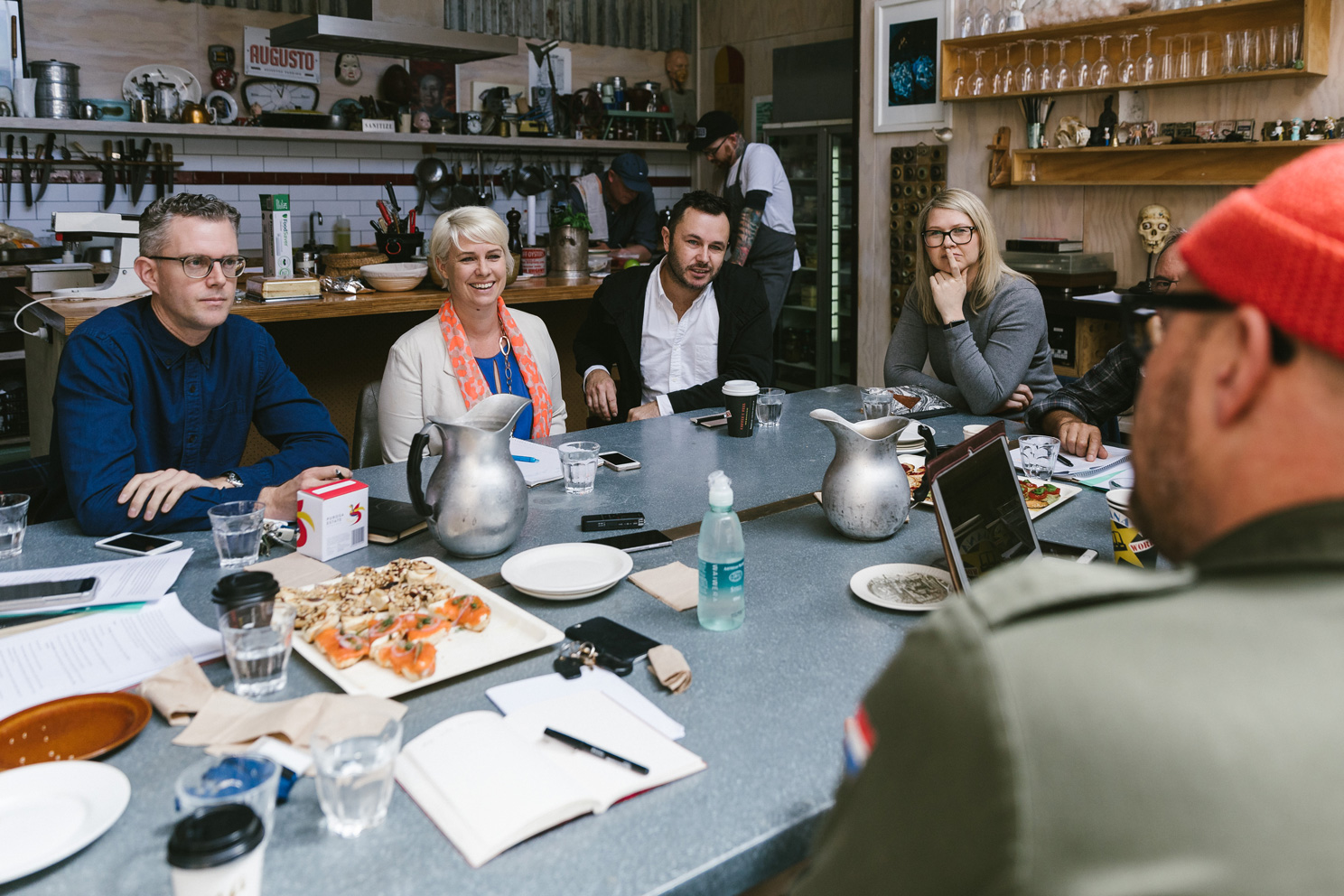 From left: Mike Murphy, Rachel Berry, Glenn Bell and Saskia Kirkbeck.
From left: Mike Murphy, Rachel Berry, Glenn Bell and Saskia Kirkbeck.
Glenn: That’s like at Burger Burger, you get your Beer Beer, cafes or restaurants are going “I’ve built this brand I need integration”. But things like having your own spaces are key as a buffer.
Rachel: I’m quite excited because the fracturing of the market drives us to innovation, and every other industry has seen innovation but our business models are lagging behind. Cafes have the same models and all their overheads have gone up over the past few years, someone needs to innovate. Like in New York they have café membership schemes for pop-ups.
Mike: I think innovation’s already happening. It’s so competitive we have to spend money on research and development, to spend lots of money to make things like cold brew happen. We have to have a portfolio of products.
Michael: It’s easy to think about product innovation, but there’s lots to be explored in terms of how we run our businesses.
Anna: Innovation in roasting itself has been pretty huge, there’s more coming into our hands to make us do our job better. But learning how to use those things is a process. If you’re not innovating you’re planning to fail. I’ve learned more in the last two years than I have in the past twenty years. The more I learn the more I realise how much more there is to learn. The next generation coming along are bigger coffee drinkers than the ones before, they’re starting younger, they’re starting at school.
Al: Like at Western Springs, they have a coffee cart that heaves in the mornings.
5. Hospitality: the role of baristas
(Led by Rachel Berry)
Rachel: I recently visited one of your accounts and had a coffee. We went in there a couple of weeks after the café had opened, we had a coffee, and the barista there, for all intents and purposes thought he’d done a good job, but he’d cleaned his machine and put the screens back in upside-down, so I think there’s a huge problem out there – the level they’re coming in at’s not high enough. We’ve got to fill up the bottom for a better pool of baristas to choose from.
The other thing is baristas don’t just make coffee, they’re the showperson that’s the conduit to a welcoming place. A great barista in my eyes is someone who knows how to make a coffee with their eyes closed, someone who can recognise the guy that’s in a hurry, can have a conversation about flavours and profiles and has time if someone wants a natter, or that person that’s just in there for a meeting – a great barista has all that stuff down. But it starts with being able to produce a coffee easy enough that they’re able to look up.
We pitched our tent here and we’re here to stay. We’ve spent the past few months innovating on how to help people learn motor skills faster, because high schools aren’t helping, they’re passing kids who are butchering coffee, it’s not helping. We use brain and sports science to give people a physical skill in a very short space of time.
Being a barista is cool but they get to 25 and they hit a ceiling and aren’t earning enough. There’s not enough career progression, the wages are low and so I don’t know the stats of how many baristas stay in roles but it can’t be high.
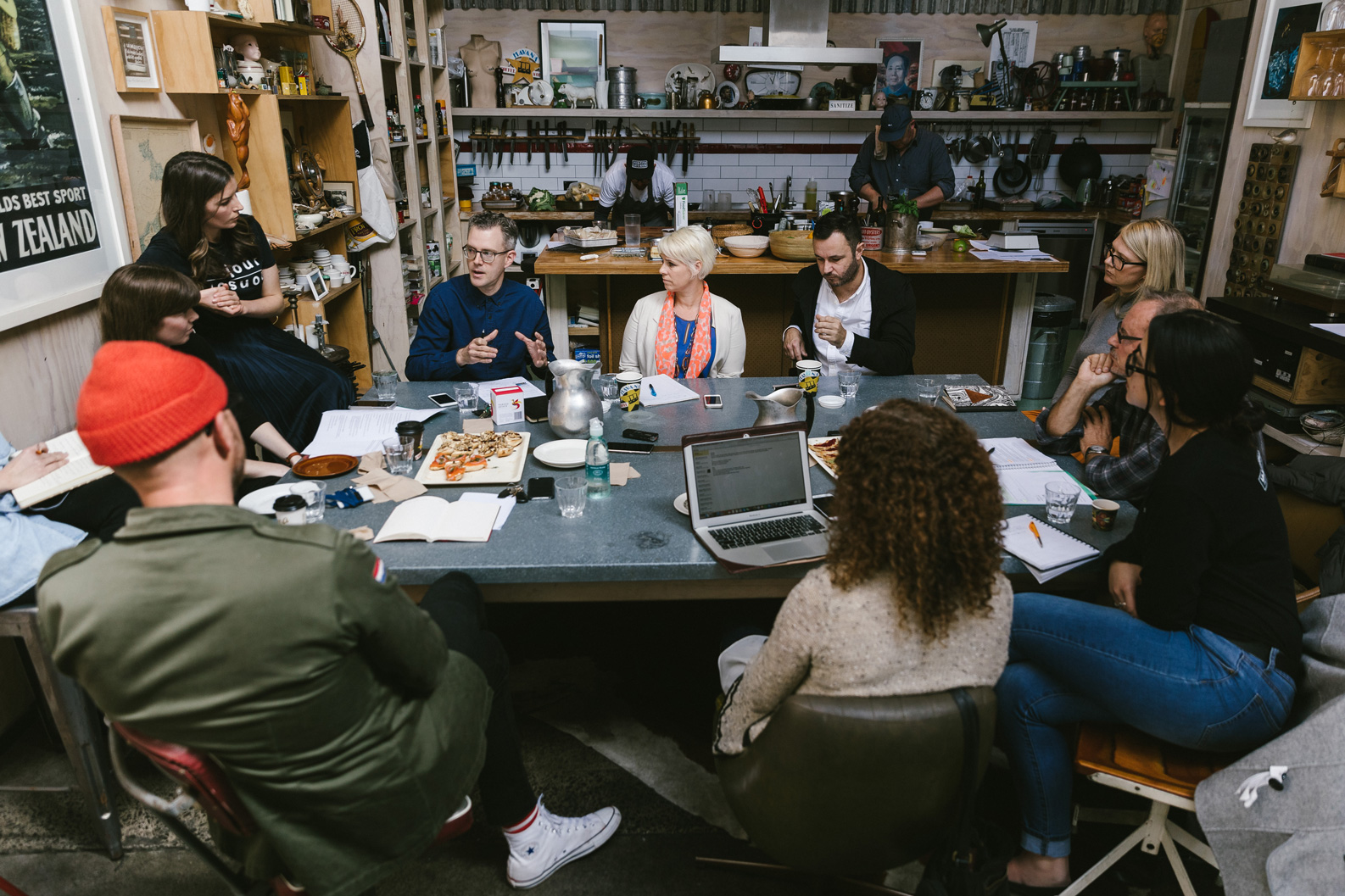
Courteney : So what’s the solution?
Anna: Pay more money. I don’t pay my baristas a low wage, I get absolutely amazed when I hear how much some baristas are paid to make 500 coffees a day. Having been a barista myself and probably having made about two million cups of coffees myself, I decided that with my staff, I wasn’t going to wear them out – we’ve put in a bar at Auckland hospital that’s got two four group La Marzocco espresso machines on one counter with four baristas manning the machines. The LaMarzocco people asked “Who’s that coffee company?! No one’s done that before,” thinking we were huge, but the reason I did that is I didn’t want the baristas to be at the end of the day worn out.
“Consumers are very perceptive about happy people, and we want happy people in cafes.”
If you’re paying them well and you’re providing a good environment for them, and you’ve got a good quality product, it’s probably one of the best business models you can make. Because consumers are very perceptive about happy people, and we want happy people in cafes. You don’t want grumpy, underpaid, undervalued people behind the counter. I’d like to challenge every café owner to pay the barista, ask them, “what do you think is a good price to be paid per hour? How do you value yourself? If you perform for me, I’m going to pay you even more than that.”
Glenn: It’s also designing your workflow and making their job less stressful, for two key staff I gave them shares in the company. And then little things, like we all go to Laneway together as a team, and things that keep people happy. We like to create a culture that people enjoy and remember. It’s not one thing – not everyone can pay that high, but you can give them ongoing training, and giving them a career path. Listening to them and hearing where they want to go – whether it’s just five years or more long term.
6. In the cup: What makes a good cup of coffee anyway?
(Led by Anna McGregor)
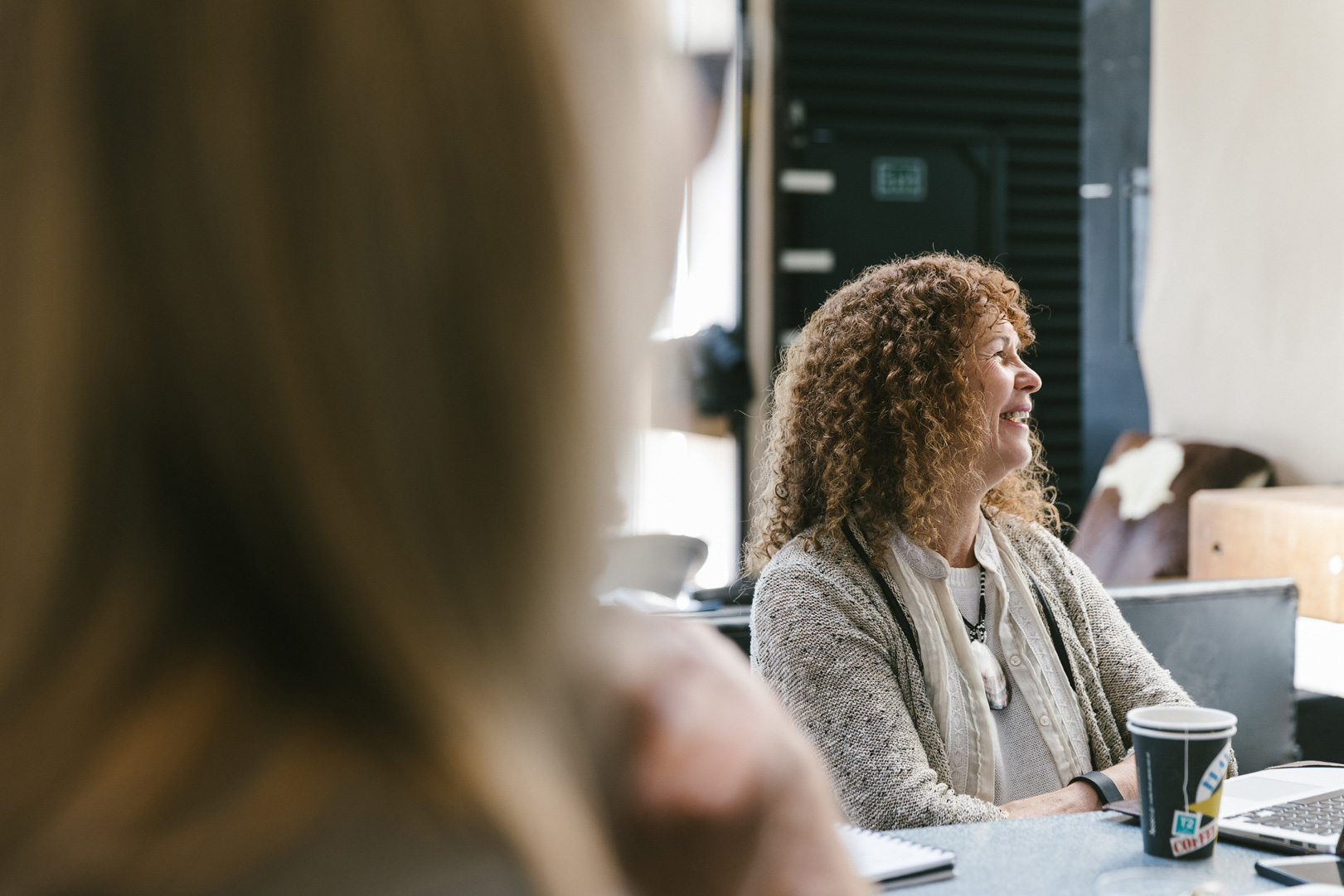 Anna McGregor, co-owner of Coffee Lab.
Anna McGregor, co-owner of Coffee Lab.
Anna: It’s a huge subject to cover to be honest. Good coffee does not just happen, there’s so much involved.
As consumers go, the more they have the opportunity to taste good quality, high grade coffee. If you pay cheap money for your beans, it’s probably not going to taste good. The more consumers get to taste good coffeeand go “wow I didn’t know coffee could taste like that!” , the better. I’ve had people say “I thought coffee was bitter naturally!” “No, it shouldn’t taste burnt.” Kiwis are happy to pay for high quality wine but think that all coffee should taste the same.
At Coffee Lab we currently have more than 20 single origin coffees. That means a coffee from one country, from one specific farm that’s fully traceable, it gives you a full origin flavour, it’s not a blend of coffee.
“I don’t want to compete with everyone but I want to sell coffee that we really enjoy, and we really enjoy doing that.”
We decided in 2010 we were not going to buy commercial grade coffee anymore. The first two pallets of specialty coffee I bought my husband saw the bill and nearly fell off his chair. But then he tried some and said “buy more!”, so I don’t want to compete with everyone but I want to sell coffee that we really enjoy, and we really enjoy doing that. We like paying higher prices for quality and ethically sourced coffee, to ensure coffee that’s good in the cup, good for the farmer, and good for the environment. You’ve got to pay for those things, a farmer can’t care well for the environment if they’re not paid for it.
7. Brand: how to make a mark in a crowded industry
(Led by Glenn Bell)
Glenn (pictured left): I was asked “What does eighthirty mean to me and how has the brand helped it grow?
Brand means a few different things: a brand is a collective perception of what we’re offering. Most business owners are very creative, and the experience we seek to create for our customers is a very creatively-driven thing. When I was first differentiating my colours, white and red, I thought, no one’s doing that yet (apart from home-brand flour), and then when we did our store we didn’t have tables but used saw horses. Every brand has to be memorable, if you want to stand out you need to offer a reason to remember you. When we did our High St store, we did pink which hadn’t been used at all.
It comes down to three things: people, culture, and the product.
And then place, trying to have a unique place. A lot of cafes in the past few years have looked the same, it’s all Vitrine tables, the same architect or interior artist – they might have missed an opportunity to push the boat out.
Courteney: Al, you run pop-up breakfast events (Popped Culture), is that a brand thing?
Al: Yes, we’re a business so we have an agenda. And we mask it very cleverly, but everything we do is about lifting up our brand. Our people as well, but our brand first. Take your brand away, people don’t have anything to work for. Take your people away, they’re the most important thing after the brand. We do Popped Culture to lift our brand up, to gather people and get regular people to fall in love with our brand. If we can put an army of people on the streets who love our brand that’s valuable. And we want to celebrate toast.
“If we can put an army of people on the streets who love our brand that’s valuable.”
Saskia: We’re so tiny, we’re still at that point where people are just discovering us, and it’s new and people like new. Everything’s about what’s in that cup. I love talking to people one on one and hearing about their relationship with coffee, how they used to have it at home, or how their grandparents have it. There’s this hot beverage that brings people together.
This couple came by recently, they went to Orphans Kitchen and had one of our filters, and they sent them down to us. The guy was 79 and said “This is the best coffee I’ve ever had.” I asked him how he has his coffee at home. He said he has a plunger, so I asked him if he decants it afterwards. “No I just let it sit there”, “and does the last cup taste a bit shit? “yeah!” “You know those beautiful coffee decanters you can buy from the Op Shop? “You just blew my mind!”/ So now he’ll go back to Christchurch and tell his friends, and now he knows our brand.
Courteney: How do some of the older brands stay fresh in the face of so many new ones?
Michael: Sounds like that question might be aimed at me! We’ve got a lot of brand equity in the whole country – it’s not hard to tell a story to a whole nation in this small country. We’ve recently shifted and changed our focus and level of investment in brand. It needed to happen, we were dealing with other stuff in terms of growth and governence, and I knew an important part of Allpress was getting a bit tired. Part of our ambition as a coffee company is to become a globally recognised brand, and we’ve got a good footprint already in terms of UK, Australia and Japan, to do that successfully we need to invest heavily in our brand language, communication and what sets us apart.
Brand’s important for all of us, you need to be really authentic. Consumers are pretty damn astute these days, if you’re pretending to be something you’re not you’re out, you’re shot dead. We’re in a pretty nice position in that sense.
“A lot of the time people don’t realise that a lot of our brands are part of the social fabric of this city.”
Mike: A lot of the time people don’t realise that a lot of our brands are part of the social fabric of this city, and we have often created opportunities for people through designers, architects or property developers, we’re the conduit who bring people together. What you’ve done particularly well, Glenn, is you’ve activated spaces that make people want to go out because you’ve done something interesting and bold. It’s really important for us as an industry to continue to diversify. I’ve just got back from Melbourne, I go there a lot, and there’s a lot of sameness. There’s the new wave of clean, slick, hotel-style espresso bars and cafes, highly staffed, but to me they’re lacking personality, it’s like man where’s the fun? I think our job is about doing great coffee but the consumer experience is first and foremost.
Anna: if you walk into a café and there’s a bad atmosphere, you’re instantly not going to like what you’re getting.
Rachel: Every customer still loves it when the person knows their name and their order. That is it. “I’m famous to this person.”
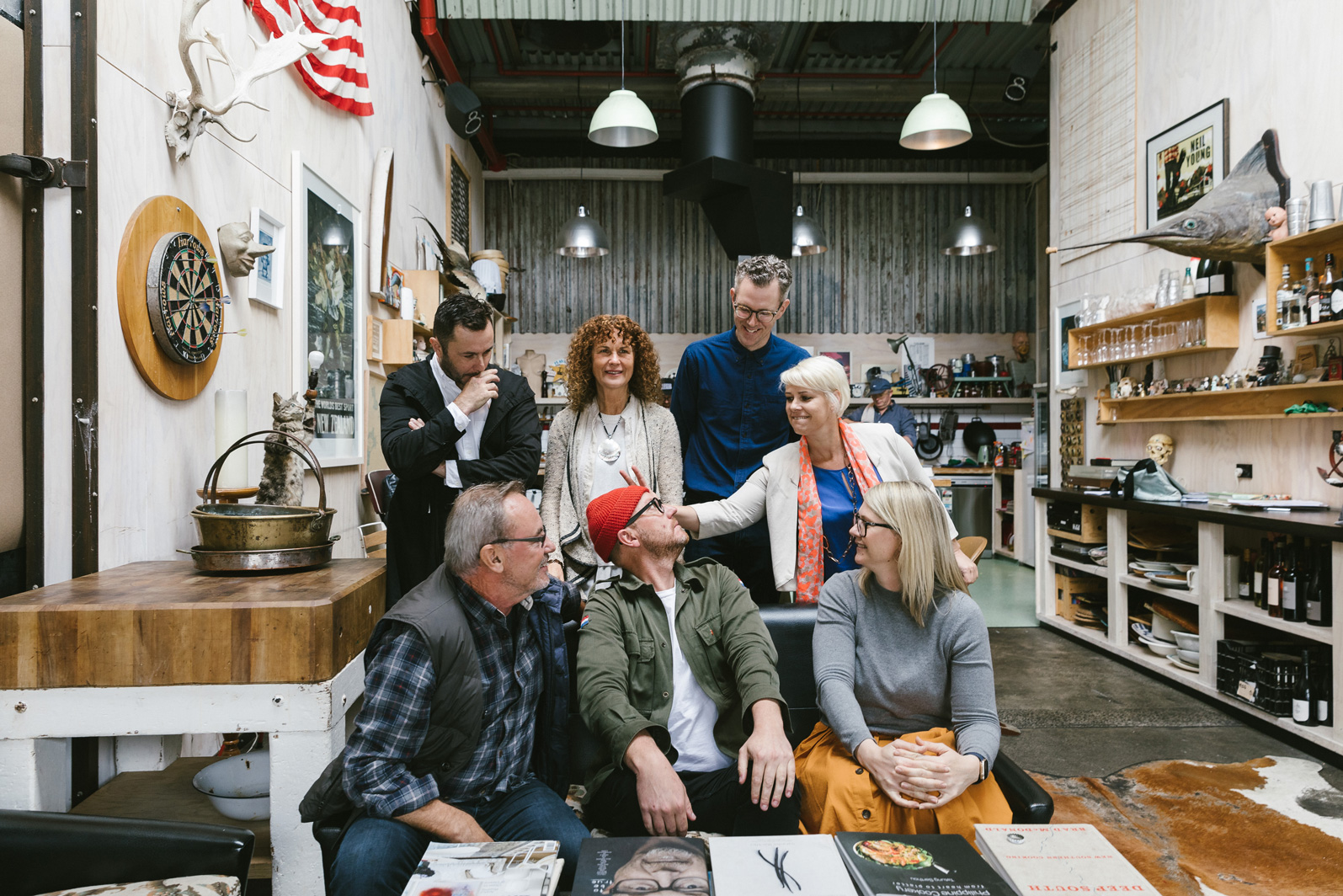
This article first appeared in the November issue of Metro
Follow Metro on Twitter, Facebook, Instagram and sign up to the weekly e-mail

